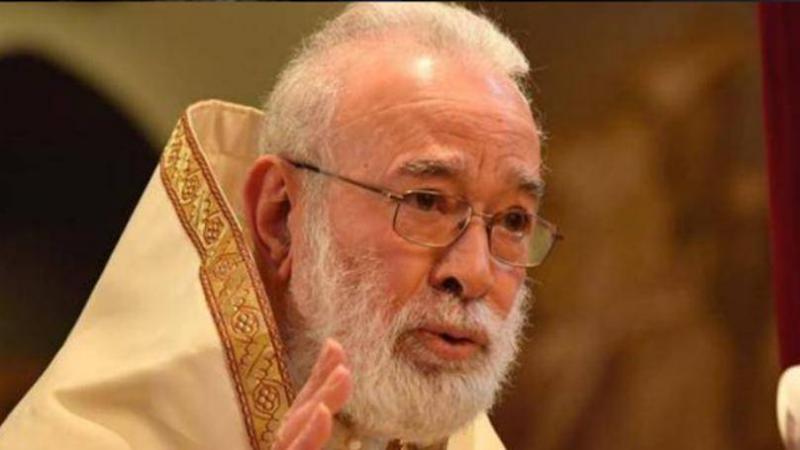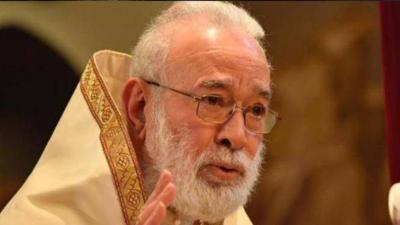Metropolitan of Beirut and its dependencies for the Greek Orthodox, Bishop Elias Audi, led a divine liturgy at St. George's Cathedral in Beirut, attended by a large crowd of believers.
After the Gospel, Audi delivered a sermon in which he stated: "Our holy Church lives a marriage of concepts that is not understood by those who are ignorant of its life. We find no conflict between mercy and justice, between fear and love, between law and grace. All are lived as stages of a single spiritual journey from the hell of evil to the paradise of grace, from slavery to freedom. The prophet David says, 'For your mercy and your truth I will sing praises to you, O Lord' (Psalm 100:1). Thus, mercy precedes and judgment follows. God first grants His grace, then comes as a just judge to reward 'each one according to his works.' He does not judge based on deeds beyond our capacity but grants us His grace and then judges us based on the fruits we produced from His gift. The fear of judgment awakens in us an awareness to activate grace, leading us to strive to live according to its commands. In this way, we move from fear that 'has torment' (1 John 4:18) to love that 'casts out' tormenting fear. Similarly, love, which is the fullness of the law, reveals the passage from the letter of divine commandments to their spirituality, from external obedience to God's will to aligning all movements of the soul according to His commandments."
He added: "In today's Gospel reading, the progression of the human spiritual journey is clearly outlined, and at the same time, the horrific consequences faced by the man who did not wish to match God's mercy in his actions are described. The debtor of ten thousand talents succeeded in requesting a remission of his debts by saying to his master: 'Have patience with me, and I will pay you all.' Fear of the king overtook him, yet he did not advance in love, did not complete his liberation, and showed no mercy to his companion who requested patience, thus losing everything. The king in today’s Gospel is the Heavenly Father who always judges His faithful servants. Every gathering of believers, especially during the divine liturgy, is a connection with God the Father, who primarily focuses on forgiving spiritual debts. The Church is the tent of God's meeting with people; we enter it as debtors of ten thousand talents seeking liberation from our debts. When we enter the church with a different mindset seeking other things, it means we are ignorant of its mission and ourselves. The awareness of our debts is the result of a living faith that God is present in every corner of our lives. The debtor of ten thousand talents stood before the king, spoke to him face to face, and this is the same that happens with us through sincere prayer, which is a departure from speaking solely of our personal requests and an opening to dialogue with the living God. This dialogue reveals our true character, showing us our stolen wealth, misappropriated from foreign riches. Thus, we discover before God the depths of our evils."
He continued: "The Evangelist tells us that the debt was a loan, and the lord of the debtor had mercy upon him and forgave his debts. But what is the loan we take from God and are indebted to return? God's loan is every divine word we hear in church; it is God's statements for which we are morally indebted after hearing thousands of words from God as a debt of the debtor of talents, as described by St. Gregory Palamas. God always grants us His grace in many ways, and we owe Him for investing it, growing the seeds of virtues within us. Repaying the debt means returning our entire existence to God, reviving the image of God within us. When the readings and hymns we hear in church, which fill our hearts with grace, remain inactive, we owe God for His gifts, as if we were in debt by ten thousand talents. However, when we feel our debt and our inability to live according to the spirit of the Word, we then possess the strength to repay it through humble prayer, asking God to be patient with us."
He said: "The journey of the debtor of ten thousand talents shows us the following stages: First, the awareness of indebtedness, which is related to the fear of the king. Second, the request for mercy, with humility. Third, receiving forgiveness. Fourth, the lack of compassion towards his companion, which results from denying the mercy of the lord, thus returning the servant to his status as a debtor. Within this journey, the mystery of the forgiveness of sins is outlined, which does not stop at the mere practice of the sacrament of confession. God grants the forgiveness of sins under conditions that are not just formal procedures where divine grace shifts automatically. Similarly, the acknowledgment of sins is not always proof of repentance, as many confess their sins with pride. Confession is a heroic and salvific act when it is associated with self-awareness and condemnation, with the desire to change our way of life and fulfill God's will in our personal lives. Those who truly repent do not condemn others as the wicked servant did and do not consider not forgiving their fellow servants, as they feel that their entire lives depend on the forgiveness of their own slips, leaving no time to look at others' shortcomings because they are preoccupied with saving themselves from their own sins. God leaves us our debts and asks for mercy, compassion, and love toward our fellow human beings; otherwise, our debt remains unpaid. Therefore, He taught us in the Lord's Prayer to say: 'And forgive us our debts, as we also have forgiven our debtors.' The forgiveness of our sins is tied to our forgiving those who have wronged us; otherwise, we fall into a closed cycle of judgment and lack of forgiveness, as our relationship with God is organized according to our attitudes toward people."
He added: "How many wicked servants there are in our country who obtain their rights through the positions and chairs they occupy, only to harm their fellow human beings who have no means to access their rights. If we had just accountability, like the king for the wicked servant, no one would dare to earn illicitly, monopolize the people's pain, humiliate them, and leave them without remedy among the living and the dead. Just accountability and sincere repentance can save the country from what it has entered into, as it awakens every citizen and leader to recognize what they have allowed themselves to do to their brothers and citizens. When one reaches self-awareness and personal judgment instead of accusing and judging others, matters adjust, and peace prevails among people. The Lebanese long with regret and bitterness for the past centuries that witnessed great leaders and remarkable achievements; they suffer from the present due to its hideousness and darkness, and they fear the future as there is no light on the horizon. Citizens are tired of arguments, tensions, and constant escalation; they are weary of empty promises, instability, and political, economic, and judicial tremors. They yearn for a calm life under a stable state, a fixed system, and leaders who work for the public interest and the common good, with integrity and sincerity. Instead of denouncing our system and laws, let us first apply the laws before working on enacting new ones; let us respect the judiciary and stay away from interfering in its rulings; let us respect deadlines and constitutional obligations, and let everyone commit to their limits and perform their duty. In short, let us apply our democratic system and its provisions without ambiguity or selectivity, and then the flaws will be studied and addressed."
He concluded: "God grants each of us talents according to our abilities and capacities; 'He gave some to be apostles, some prophets, some evangelists, and some pastors and teachers' (Ephesians 4:11). Each individual must bear fruit with their talents and allow others to work according to what they have been given instead of monitoring and judging them, as judgment belongs to God alone, while man is called to work and build. In the end, our call today is to love the other and forgive him, as God forgives us if we truly repent. May the Lord bless you and plant in your hearts mercy, love, and justice."




